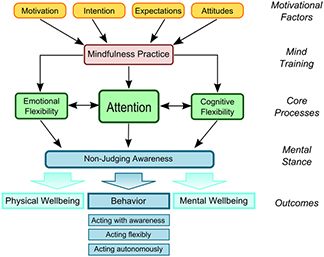Difference between revisions of "Computational Theories of Mindfulness"
(→Psychological Mechanisms) |
|||
| Line 9: | Line 9: | ||
'''Cognitive control''' | '''Cognitive control''' | ||
| + | |||
Mindfulness training has been shown to enhance cognitive control in children and adults [https://link.springer.com/article/10.1007/s12671-019-01279-4]. On a phenomenological level, the process of mindfulness training engages with the self-regulation of cognitive states that are interrelated with attentional [https://en.wikipedia.org/wiki/Neural_network networks]. | Mindfulness training has been shown to enhance cognitive control in children and adults [https://link.springer.com/article/10.1007/s12671-019-01279-4]. On a phenomenological level, the process of mindfulness training engages with the self-regulation of cognitive states that are interrelated with attentional [https://en.wikipedia.org/wiki/Neural_network networks]. | ||
[[File:Malinowski_2013_1.jpg ]][https://www.frontiersin.org/articles/10.3389/fnins.2013.00008/full] | [[File:Malinowski_2013_1.jpg ]][https://www.frontiersin.org/articles/10.3389/fnins.2013.00008/full] | ||
| + | |||
| + | Within [https://en.wikipedia.org/wiki/Cognitive_psychology cognitive psychology], [https://en.wikipedia.org/wiki/Attention attention] consists of sub-processes (including alerting, [https://en.wikipedia.org/wiki/Attention_span sustained attention], and conflict monitoring) that underlie the ability to attend to stimuli. Higher self-reported mindfulness is related to higher measures of more stable sustained attention [[https://www.frontiersin.org/articles/10.3389/fnins.2013.00008/full]]. Furthermore, longitudinal studies have found that engaging in mindfulness practices correlated with improvement in sustained attention tasks over the course of intervention (https://psycnet.apa.org/record/2008-17304-003). | ||
Revision as of 23:45, 21 October 2022
By Liza Tatishev
Mindfulness involves non-judgmental moment-to-moment self-awareness of physical and mental states– it is the ability to be fully conscious and aware. Within the past decade, scientific interest in mindfulness practices has increased. Mindfulness has a long history: originating over 2,500 years ago in Indian Buddhist tradition [1]. By the mid-twentieth century, mindfulness became secularized and incorporated into psychological intervention methods to improve emotional well-being [2]. Today, mindfulness-based intervention methods are recognized as successful approaches in treating a variety of psychological disorders, including depression, anxiety, and addiction. A more precise understanding of mindfulness can benefit the refinement of mindfulness-based intervention methods.
A more precise understanding of mindfulness can benefit the refinement of mindfulness-based intervention methods. Artificial neural networks within the field of computational neuroscience offer a method to examine the neuroscience of mindfulness.
Psychological Mechanisms
As a psychological intervention method, mindfulness practices– such as Tibetan Buddhist imagery meditation [3], Zen meditation [4], and Kundalini yoga [5]– are grounded in training and refining attention skills. Attentional control is a key cognitive process of executive functioning (also referred to as cognitive control) necessary for emotional and behavioral regulation [6].
Cognitive control
Mindfulness training has been shown to enhance cognitive control in children and adults [7]. On a phenomenological level, the process of mindfulness training engages with the self-regulation of cognitive states that are interrelated with attentional networks.
Within cognitive psychology, attention consists of sub-processes (including alerting, sustained attention, and conflict monitoring) that underlie the ability to attend to stimuli. Higher self-reported mindfulness is related to higher measures of more stable sustained attention [[9]]. Furthermore, longitudinal studies have found that engaging in mindfulness practices correlated with improvement in sustained attention tasks over the course of intervention (https://psycnet.apa.org/record/2008-17304-003).
